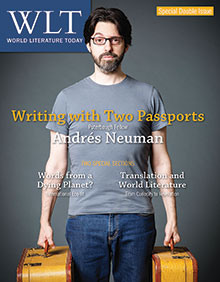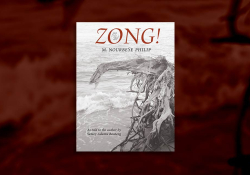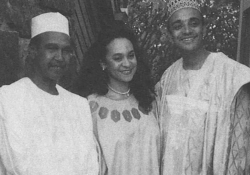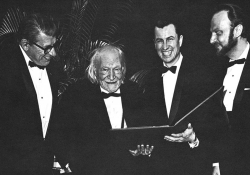Reading the Double Issue
 In WLT’s May 2014 issue, I was especially intrigued by the article on Mass Reading Events (MREs) by Danielle Fuller and DeNel Rehberg Sedo. In 2010 I attended a marathon reading of Frederic Tuten’s novel The Adventures of Mao on the Long March, on the occasion of the fortieth anniversary of its publication, in the beautiful Jane Hotel in New York City. Sixty readers and a few hundred others packed the first-floor sitting lounge, sitting on couches, easy chairs, folding chairs, and standing behind pillars and bannisters. Attending were well-known writers such as Oscar Hijuelos, Walter Mosley (both past students of Tuten), Jerome Charyn, and Wallace Shawn, not to omit numerous other distinguished authors and artists. One of the readers sang; another augmented his reading with the deployment of marionettes. It took perhaps five hours to read the entire novel aloud; there was food and drink, and the audience was rapt. Fuller and Sedo demonstrate how other forms of social and digital interaction can bring books to life, and into other dimensions—a far cry from some old-fashioned open-mic readings wherein, too often, most poets and writers are busy looking down at their own work rather than actually listening. It is refreshing to see that Fuller and Sedo are all about empowering the book and not busy bemoaning its prematurely celebrated funeral.
In WLT’s May 2014 issue, I was especially intrigued by the article on Mass Reading Events (MREs) by Danielle Fuller and DeNel Rehberg Sedo. In 2010 I attended a marathon reading of Frederic Tuten’s novel The Adventures of Mao on the Long March, on the occasion of the fortieth anniversary of its publication, in the beautiful Jane Hotel in New York City. Sixty readers and a few hundred others packed the first-floor sitting lounge, sitting on couches, easy chairs, folding chairs, and standing behind pillars and bannisters. Attending were well-known writers such as Oscar Hijuelos, Walter Mosley (both past students of Tuten), Jerome Charyn, and Wallace Shawn, not to omit numerous other distinguished authors and artists. One of the readers sang; another augmented his reading with the deployment of marionettes. It took perhaps five hours to read the entire novel aloud; there was food and drink, and the audience was rapt. Fuller and Sedo demonstrate how other forms of social and digital interaction can bring books to life, and into other dimensions—a far cry from some old-fashioned open-mic readings wherein, too often, most poets and writers are busy looking down at their own work rather than actually listening. It is refreshing to see that Fuller and Sedo are all about empowering the book and not busy bemoaning its prematurely celebrated funeral.
When one encounters a protest poem like Aryeh Sivan’s about the three boys, which is rich and innovative yet profoundly accessible, one is somehow refreshed and anguished at the same time.
I read Rachel Tzvia Back’s piece on protest poetry with great interest, having grown up in the 1960s protest generation. Before Robert Bly became the high priest of men returning to moose-hood, he was a brilliant poet against the war—“The Teeth Mother Naked at Last” was one of the best poems of its generation, transcending in my view even Allen Ginsberg’s “Howl.” So much US poetry seems to be focused on the imagistic and estranged (I am as guilty as anyone at times)—what Ashbery was heard to call “distilling strange essences from nothing”—that when one encounters a protest poem like Aryeh Sivan’s about the three boys, which is rich and innovative yet profoundly accessible, one is somehow refreshed and anguished at the same time.
I especially liked the piece by Michael Wood on translating Rilke. Back in the mid-1970s, a grad assistant named Ron Phelps translated schrie as screamed, perhaps before Norris and Keele; Ron was a flamboyant guy and a brilliant writer and poet, who completely disrobed in his composition class because of his anger that his students were fuzzily inattentive, immolating his didactic career. But it has stayed with me ever since—the idea that we live in a realm of almost schizophrenic terror on earth. I know no German to speak of, but I would translate schrie as “shrieked,” as did one translator, and starkeren as “starker” existence, even if they are not totally accurate. Is it not important to adhere to the sound of words as well as their meaning where possible, or to create an alternative universe where sometimes sound trumps meaning, a universe of onomatopoeia? Well, I know that’s just flat outrageous and presumptuous of a guy who just knows the phrases Stadtmitte, bitte, and bitte kein Handtuch benutzen!
By the way, reading WLT digitally is a pleasure, especially since I can make the text larger or smaller by clicking and drag it about in the larger view. I have been reading this issue both ways. The Zinio presentation is excellent!




